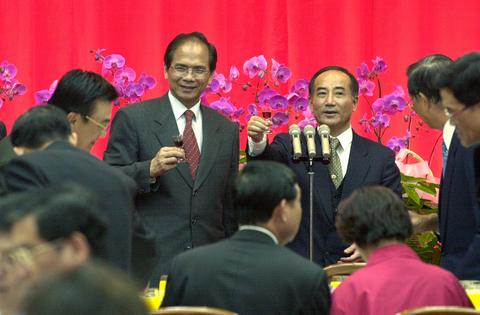Premier Yu Shyi-kun yesterday asked lawmakers to swiftly approve measures to stimulate the economy which he said has already been through the worst and will register a robust performance if the executive and legislative branches join forces to pursue the end.
Yu made the call while briefing the lawmaking body on his policy goals in keeping with a custom to open a new legislative session.
Topping the executive agenda are eight economic stimulus packages, including proposals to expand public construction and regulate transfer of high-tech knowledge across the Taiwan Strait, and three political reform bills.

PHOTO: GEORGE TSORNG, TAIPEI TIMES
"Economic prosperity is critical to Taiwan's continued existence, which may not be achieved without a sound financial system," Yu said, underscoring the importance of the 11 initiatives.
The Cabinet has requested NT$50 billion in extra spending to fund a public construction program unveiled last December to distend domestic demand and battle unemployment.
The measure is expected to prop up the economy by 0.38 percent and generate 40,000 job opportunities by the end of this year when it and the NT$200 billion job-creation program are due to expire.
The government also has proposed increasing a financial restructuring fund to NT$1.05 trillion to help banks write off their non-performing loans.
This proposal and legislation to create a financial supervision board have languished in the legislature as the caucuses disagree over their merits.
"To help the country stay competitive, the legislature must not stave off those bills any longer," Yu said. "As is widely known, an excess number of financial institutions has rendered the sector unprofitable. The situation shows the need for prompt reform."
The premier said he expected an economic growth of 3.5 percent this year, roughly the same as last year when the economy stopped its downward trend and started to recover.
"Studies at home and abroad show the worst is over," Yu said, noting that export orders witnessed a two-digit upswing in the last nine months and unemployment has eased off.
"United, we can put up a stronger economic performance," Yu said. "Let's have confidence and put a stop to the defeatist rhetoric, lest it become a self-fulfilling prophecy."
Alluding to the KMT-PFP plan to field a joint ticket for next year's presidential election, the premier said he doubted any individuals can work miracles in meeting challenges facing the country.
"It seems it is fashionable to say who should run in the next presidential polls," he said. "In my view, unselfish collaboration between the Cabinet and the legislature emerges as the best way to promote welfare for the people."
The Cabinet has also listed as priorities its bills to regulate political parties and their assets, and to set up an anti-corruption administration under the Ministry of Justice.
All three proposals failed to pass in the last legislative session as opposition lawmakers voiced concern such measures might be abused by the DPP government to attack political foes.

An essay competition jointly organized by a local writing society and a publisher affiliated with the Chinese Communist Party (CCP) might have contravened the Act Governing Relations Between the People of the Taiwan Area and the Mainland Area (臺灣地區與大陸地區人民關係條例), the Mainland Affairs Council (MAC) said on Thursday. “In this case, the partner organization is clearly an agency under the CCP’s Fujian Provincial Committee,” MAC Deputy Minister and spokesperson Liang Wen-chieh (梁文傑) said at a news briefing in Taipei. “It also involves bringing Taiwanese students to China with all-expenses-paid arrangements to attend award ceremonies and camps,” Liang said. Those two “characteristics” are typically sufficient

A magnitude 5.9 earthquake that struck about 33km off the coast of Hualien City was the "main shock" in a series of quakes in the area, with aftershocks expected over the next three days, the Central Weather Administration (CWA) said yesterday. Prior to the magnitude 5.9 quake shaking most of Taiwan at 6:53pm yesterday, six other earthquakes stronger than a magnitude of 4, starting with a magnitude 5.5 quake at 6:09pm, occurred in the area. CWA Seismological Center Director Wu Chien-fu (吳健富) confirmed that the quakes were all part of the same series and that the magnitude 5.5 temblor was

The brilliant blue waters, thick foliage and bucolic atmosphere on this seemingly idyllic archipelago deep in the Pacific Ocean belie the key role it now plays in a titanic geopolitical struggle. Palau is again on the front line as China, and the US and its allies prepare their forces in an intensifying contest for control over the Asia-Pacific region. The democratic nation of just 17,000 people hosts US-controlled airstrips and soon-to-be-completed radar installations that the US military describes as “critical” to monitoring vast swathes of water and airspace. It is also a key piece of the second island chain, a string of

The Central Weather Administration has issued a heat alert for southeastern Taiwan, warning of temperatures as high as 36°C today, while alerting some coastal areas of strong winds later in the day. Kaohsiung’s Neimen District (內門) and Pingtung County’s Neipu Township (內埔) are under an orange heat alert, which warns of temperatures as high as 36°C for three consecutive days, the CWA said, citing southwest winds. The heat would also extend to Tainan’s Nansi (楠西) and Yujing (玉井) districts, as well as Pingtung’s Gaoshu (高樹), Yanpu (鹽埔) and Majia (瑪家) townships, it said, forecasting highs of up to 36°C in those areas